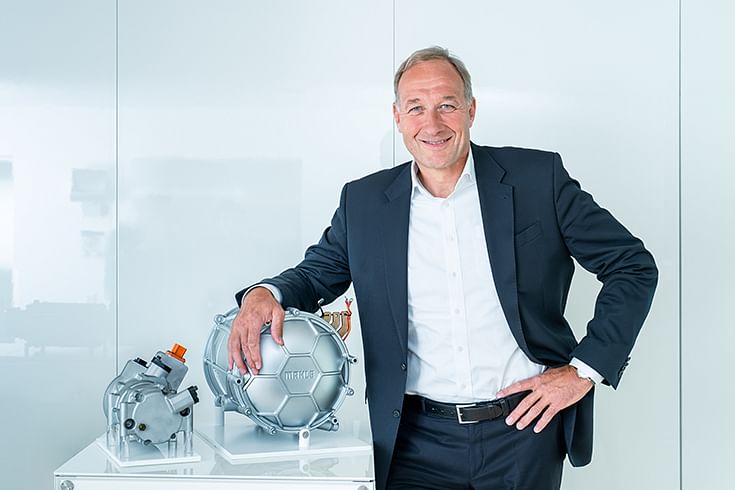Mahle’s order volume for e-compressors grows to 1.4 billion euros
Between 2022 and 2026, more than 20 electrified vehicle platforms from leading passenger car and CV manufacturers are slated to be launched with Mahle technology and products.
Technology company Mahle is fast growing its footprint as a supplier for e-mobility. One of its bestsellers is the electric A/C compressor, for which the technology group from Stuttgart has already secured numerous series orders in the passenger car and commercial vehicle sectors. The total order volume is approximately 1.4 billion euros (Rs 11,824 crore).
Mahle has recently introduced its most powerful e-compressor currently available on the market with a peak power of 18 kW. E-compressors are the heart of thermal management in electric vehicles. The key component is important for the temperature control of the e-drive and thus crucial for the service life, charging speed and cruising range of the battery. In addition, it ensures pleasant passenger comfort.

“Mahle will continue to expand its role as a complete system supplier for air-conditioning in electric vehicles,” said Arnd Franz, Chairman of the Management Board and CEO of the Mahle Group (pictured above).
With its electric A/C compressor, Mahle states it is a pioneer in high-voltage technology, i.e. voltage levels above 400 volts, and large compressor displacements. These characteristics enable, for example, ultra-fast charging, which is so important for modern EVs. The company currently offers its high-voltage compressor in voltage ranges up to 900 volts and displacements up to 57 ccm. Its compact design means that it can be used in all vehicle classes, from passenger cars to heavy-duty commercial vehicles. The extremely small installation space requirements are made possible by the patented refrigerant cooling of the compressor motor and electronics.
One of the biggest challenges with electric battery-powered vehicles is also cabin acoustics. Here, passengers find the smallest vibrations and the slightest noise developments disturbing. Mahle claims its noise-optimised high-voltage compressor effectively causes just slightest vibrations. The result is very smooth running and best acoustics.
Targeting 75% of sales from global EV industry by 2030
Mahle also develops and produces electric actuators, auxiliary components, engine accessories, auxiliary aggregates, the electronics and software, and the entire thermal management system. E-mobility and thermal management are among the technology group's strategic fields. Between 2022 and 2026, more than 20 electrified vehicle platforms from leading passenger car and commercial vehicle manufacturers will be launched on the market that rely on Mahle technology and products. The supplier is thus fully on course for transformation. The supplier says it already generates over 60% of its sales independently of the passenger car combustion engine. This should increase to 75% by 2030.
In 2021, Mahle generated sales of around 11 billion euros (Rs 92,906 crore) in 2021. The company currently has over 71,000 employees at 160 production locations, including India, and 12 major R&D centres in more than 30 countries.
RELATED ARTICLES
Autoliv Plans JV for Advanced Safety Electronics With China’s HSAE
The new joint venture, which is to be located strategically near Shanghai and close to several existing Autoliv sites in...
JLR to Restart Production Over a Month After September Hacking
Manufacturing operations at the Tata Group-owned British luxury car and SUV manufacturer were shut down following a cybe...
BYD UK Sales Jump 880% in September to 11,271 units
Sales record sets the UK apart as the largest international market for BYD outside of China for the first time. The Seal...






 By Autocar Professional Bureau
By Autocar Professional Bureau
 30 Nov 2022
30 Nov 2022
 6508 Views
6508 Views








 Ajit Dalvi
Ajit Dalvi




